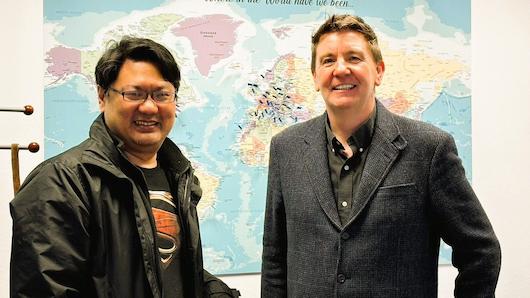美國龍頭企業心頭定 仍帶頭減碳
川普2.0使全球政經情勢更詭譎多變,近期揮出的對等關稅大刀,更使全球經濟疆域瞬間被劃分為美國與非美國。尤其,川普早就揚棄温室效應危害論,企圖走回使用化石能源的老路,不僅與各國主流政策漸行漸遠,甚至背道而馳致產生矛盾對立情勢。
政客通常短視近利,只求任內政績,但企業領袖因永續經營願景,必須要以更宏觀的思維與長遠謀略任事。全球國際大廠在這場政治巨變中,不改對減碳的承諾,尤其,美國龍頭企業目前仍持續帶領供應鏈朝減碳前進。
漂綠是兒戲 邁向碳中和最怕脫隊
益珂環能總經理周家豪博士表示,台灣產業發展與國際高度連動,企業在邁向碳中和的過程最怕脫節掉隊,所以規劃時要有國際高度全球視野,更要步步為營。不過,他坦誠目前企業、市場與政府間,現況存有現實與理想間的鴻溝,卻是不爭事實。
周家豪強調,從今(2025)年開始,全球產業鏈將進入一個大洗牌的陣痛期,若企業沒有做好應對新挑戰的準備,或是心存僥倖想靠漂綠應付,其結果很快就會被邊緣化,不可兒戲。
美國新政藏變數 加強碳資產流通
談到美國退出巴黎氣候協定以及川普諸多不按牌理出牌的動作,周家豪憂心將引發新波瀾,會為國際永續帶出不利風向,甚至帶來更多波折。相對於美國,日前在德國彼得堡氣候對話(Petersburg Climate Dialogue),UNFCCC執行秘書西蒙 斯蒂爾(Simon Stiell)強調,未來6年内將减排43%、2035年减排60%,2050 年實現淨零,讓我們再看到全球堅實的承諾。

周家豪認為,在這項全球目標下,環境與企業永續兩者並非對立,因為其中存有諸多解方。因為企業透過減碳追求永續,可以透過特定機制運行,同步增加企業永續競爭力。他預期,再生能源將持續開發、綠電將更普及,全球將有更多碳權導入的積極作為,其中,最重要的是促進全球碳資產的更廣泛流通。
擴增綠電來源 永續轉型勢不可免
周家豪去年在COP29發言,今年他希望有機會在Oxford, Belem等地分享更多案例。從世界看台灣,只靠光電風電2030年淨零將無法達標。他舉例,綠電平台這些中間商的綠電來源若利潤迭遭壓縮,形同兩面夾擊,處境將相當危險,不利後續。
明後年歐盟將開徵的碳稅近期傳出簡化政策,將大幅縮減徵收對象與範圍,約為原先計劃對象的20%,主要鎖定占整體碳排量97%的碳排大戶;雖然政策有望讓數以萬計中小企業免於繳納CBAM憑證費用,但這也象徵全球減碳決心的進一步具體化,敲響企業終究必須轉型的警鐘。
取得第三方認證 聰明用國際碳權
問到面對來自海內外危機,台灣企業該如何因應。周家豪指出,2025年是關鍵,企業想在全球供應鏈中適者生存,要有第三方認證。尤其,台灣並非聯合國會員,未能參與巴黎氣候協定,在世局多變的不穩定市場中,台灣企業應積極起而行,設法取得在國際永續供應鏈中的有利條件,不能一再觀望。

如何創造有利條件?周家豪說,碳權是碳中和行動核心,不可或缺。但是價格有高有低,品質也良莠不齊,碳中和必須在技術認定、金融機制與國際市場整合下才能真正實現。他強調,益珂環能善長以AI技術分類、開發、應用國際碳權,與坊間專案公司、碳權平台及氣候公司大不同。
英國業務台灣技術 全球銷售未來
周家豪說,我們擬定的發展策略以企業永續經營為切入點,分工上以益珂英國為全球業務主體,台灣部分則發揮擅長的技術開發。去年專案落地後,目前專注國際專案開發,其中並以AI生成做為協助企業發展的關鍵技術,周家豪笑著說We are selling the future ! (本文於英國同步推出,英譯版由益珂提供)
--
Navigating the Post-Trump Era: Why Global Enterprises Must Lead in the Carbon Transition
As geopolitics shift and sustainability goals tighten, the role of business leaders is more critical than ever.
The global political and economic landscape has grown increasingly turbulent and unpredictable, especially in the wake of Donald Trump’s presidency. From abrupt tariff policies that split the global economy into "America" and "non-America," to a blatant dismissal of climate change and a return to fossil fuels, Trump’s actions have created deep divides—isolating the United States from the global sustainability consensus and igniting new tensions across international arenas.
While political figures often chase short-term wins within their terms, corporate leaders—driven by the imperative of long-term sustainability—must take a broader, more strategic view. Major multinational corporations, including American industry giants, have held firm in their carbon reduction commitments. Many continue to lead decarbonization efforts across supply chains, despite shifting political winds.
Taiwan’s Challenge in a Global Carbon Economy
Echoing this global trend, Dr. Chia-Hao Chou, Managing Director of EcoStrategy, emphasizes that Taiwan’s industrial development is deeply entwined with international dynamics. “As businesses worldwide move toward carbon neutrality, Taiwan must not fall behind. Strategic alignment with global standards and vision is essential,” he states.
However, Chou is candid about the significant gap between ideal goals and practical realities across governments, markets, and enterprises. “By 2025, the global supply chain will undergo a painful realignment. Companies unprepared for this transformation—or those attempting greenwashing—will quickly be marginalized.”
Global Goals Demand Local Action
The global sustainability movement faced disruption when the U.S. exited the Paris Agreement. Yet international momentum remains strong. At the recent Petersburg Climate Dialogue in Germany, UNFCCC Executive Secretary Simon Stiell reaffirmed a bold roadmap: a 43% emissions reduction by 2030, 60% by 2035, and net-zero by 2050.
In response, Chou asserts that environmental sustainability and corporate profitability are not mutually exclusive. With the right mechanisms, carbon reduction can become a competitive advantage. "We’re seeing continuous development in renewable energy, broader adoption of green electricity, and a surge in carbon credit integration. But above all, the key lies in the global circulation of carbon assets."
Third-Party Certification & Carbon Rights: Taiwan’s Imperative
Chou warns that 2025 will be a make-or-break year. Companies that wish to remain viable in global supply chains must pursue third-party certification. Taiwan, excluded from the UN and not a Paris Agreement signatory, must take proactive steps—not a wait-and-see approach—to secure its role in international sustainability frameworks.
Carbon credits, Chou explains, are indispensable to achieving carbon neutrality. However, market quality varies. True decarbonization depends on the convergence of verified technology, financial mechanisms, and international standards. EcoStrategy has positioned itself as an AI-driven enterprise, differentiating itself from conventional carbon project firms and trading platforms by leveraging artificial intelligence to classify and apply carbon credits on a global scale.
Chou elaborates, “EcoStrategy, as a UK corporation, will leads our global strategy, while Taiwan branch excels in AI and other technical development. After successfully launching projects last year, we’re now focused on expanding our international impact.” With a smile, he adds: “We are selling the future.”
From COP29 to the CBAM Countdown: A Wake-Up Call for Business
After speaking at COP29 last year, Chou hopes to share more case studies this year. Looking at Taiwan from a global perspective, he warns that relying solely on solar and wind power will not be enough to meet 2030 targets. Moreover, green energy resellers face mounting pressure, squeezed between cost and profit margins.
With the EU’s Carbon Border Adjustment Mechanism (CBAM) set to take effect by 2026/2027, recent reports indicate a policy shift—narrowing CBAM’s scope to focus on the industries responsible for 97% of emissions, potentially exempting tens of thousands of smaller firms. While this may ease short-term financial burdens, it sends an unmistakable message: the world’s commitment to decarbonization is accelerating, and the clock is ticking.
Transformation is no longer optional—it’s inevitable. The only question is whether businesses will lead or lag behind.
延伸閱讀
















